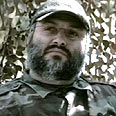
Mugniyah. 'Body transferred to Beirut'
צילום: רויטרס
Hizbullah says kidnapped Mugniyah's body
Senior group official reveals Lebanese MPs identified assassinated commander's body and took it to Beirut following order from Nasrallah
Two months after the Damascus explosion which killed top Hizbullah commander Imad Mugniyah, a senior organization member has revealed that Lebanese parliament members removed the body from Syria to Lebanon, following an order from Hizbullah Secretary-General Hassan Nasrallah.
According to the group member, only after the body arrived in the Beirut, Nasrallah informed Syrian President Bashar Assad that Mugniyah was assassinated in the Syrian capital.
In an interview with the Syrian newspaper al-Hakikah, quoted by Iran's Fars News Agency, the senior Hizbullah man recounted the Damascus assassination.
"Mugniyah was one of the first people to leave the Iranian cultural center in Damascus' Kfar Suseh neighborhood. He was there with a group of Hizbullah parliament members. After the blast occurred, several members of the same group took to the street to see what happened.
"One of the parliament members realized at once that Mugniyah was killed in the explosion. He immediately called Nasrallah and informed him of the incident. The Hizbullah leader demanded that the body be taken to Beirut immediately without the Syrian intelligence spotting it – and that's what happened."
The senior member added, "They put Mugniyah's body in one of the parliament members' car and it was immediately taken to Lebanon without anyone in Syria, apart from the regular police perhaps, seeing it."
The Hizbullah man went on to say that after Mugniyah's body had already reached Lebanon, Nasrallah called Syrian President Bashar Assad and informed him of the assassination.
"Assad immediately asked Nasrallah not to announce the murder, but was told by the latter, 'We do not hide our shahids (martyrs) regardless of their role or rank. We are proud of them.'
"One of the explanations for Assad's request was Syria's embarrassment after it failed to protect a person who led a 33-day war against Israel but was killed so easily in the Syrian capital."
'Mugniyah worked on drawing lessons'
The Hizbullah member was also asked about the impact of Mugniyah's assassination on the organization.
"It's true that Mugniyah's death was considered one of the greatest losses in the ranks of the 'resistance'… and that the loss caused great grief among Hizbullah and its public. But Hizbullah is not one person, but rather institutions in the full sense of the word."
Addressing Mugniyah's role in Hizbullah, the organization member said that "before his death, the shahid worked with his colleagues on drawing theoretical and practical lessons from the recent war."
The Hizbullah member took advantage of the interview to threaten Israel. "In the next war, we will run the battle for the first time since 1948 inside Palestine. They will be more surprised than ever before, as they will see our fighters fighting them not only in Lebanon, as they did till now, but also inside their homes and settlements.
"The next war, if it breaks out, will be an offensive war on our part. This doesn’t mean we will initiate the war, but that every war they launch in the future will become what the organized armies in the world refer to as a counteroffensive on our part. They will see our fighters behind their lines, not just in front of them."










